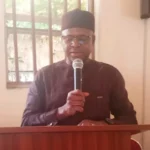By Ginika Okoye, News Agency of Nigeria (NAN)
It was Eric Hoffer, an American moral and social philosopher who observed that disappointment is a sort of bankruptcy, the bankruptcy of a soul that expends too much in hope and expectation.
The Hoffer quote captures the disposition of many bank customers who at one time were victims of failed banks in Nigeria.
Analysts say the experience of failed financial institutions could be a devastating blow to depositors as trust is shattered resulting in ruins in financial dreams hitherto secured future.
They opine that the ugly experience undoubtedly has been the lot of most bank depositors over the years in failed banks such as Savannah Bank and most recently Heritage Bank.
But amidst these uncertainties and heart-wrenching experiences of victims of failed banks, experts say the Nigeria Deposit Insurance Corporation (NDIC) has stood as a beacon of hope for customers of failed banks.
NDIC was established to protect depositors, and contribute to the stability of the financial system.
It aims to achieve this through effective supervision of insured institutions, provision of financial/technical assistance to eligible insured institutions, prompt payment of guaranteed sums and orderly resolution of failed insured institutions.
The Corporation has consistently bridged the gap and played critical roles in maintaining financial system stability, exploring its strategies, successes, and the impact on the lives of bank depositors.
The Central Bank of Nigeria (CBN) is responsible for issuing and revoking licenses of banks and once a bank’s license is revoked, the NDIC steps in as the liquidator to carry out failed bank closure.
Reports from NDIC says the Corporation as at date, has closed a total of 651 banks involving 50 Deposit Money Banks (DMBs), 55 Primary Mortgage Banks (PMBs), and 546 Microfinance Banks (MFBs).
To this end, the Managing Director of NDIC, Mr Bello Hassan, said the Corporation had paid 86 per cent of total insured deposits for customers of the defunct Heritage Bank.
According to him, timely reimbursement to depositors is key to maintaining financial stability.
He said the Corporation reviewed the Maximum Deposit Insurance Coverage for Deposit Money Banks from N500,000 to N5 million, Microfinance Banks from N200,000 to N2 million, Primary Mortgage Banks from N500,000 to N2 million, and Mobile Money Operators from N500,000 to N5 million.
Hassan said the update aims to bolster depositor safety, public trust, the inclusivity of financial services, and the overall stability of the financial sector.
“In this regard, the Corporation has reassessed its depositor payment methodology with a view to adopting a different approach that will ensure prompt payments to depositors.
”This was tested in the recent payment to depositors of Heritage bank in-liquidation.
”It is instructive to mention that, the Corporation using the Bank Verification Number (BVN) of depositors obtained from Nigeria Inter Bank Settlement System (NIBSS) was able to access alternate accounts of customers and commenced payment to depositors within a record time of four (4) days,” he said.
Bello said the Corporation had strengthened its collaboration with the judiciary to expedite the prosecution of failed financial institutions.
He said the collaboration had resulted in the resolution of long standing cases and the declaration of 100 per cent liquidation dividends to uninsured deposits of over 20 closed banks.
The director-general said that alternative dispute resolution mechanisms had also been employed to enhance the Corporation’s liquidation activities and improve debt recovery.
On challenges of banks’ liquidation, he said the Corporation had experienced difficulties in loan recoveries.
Hassan, however, assured that the Corporation would immediately commence the process to avoid delays.
On litigation, he said the Corporation was ready for any litigation that would emanate from the handover of the bank.
Hassan said the Corporation would rely on support from the judiciary for expedited hearings on any debt recovery case brought by the Corporation,” the managing-director said
Mrs Pamela Roberts, the closing Manager of the defunct Heritage Bank, said the Corporation had adopted some innovative approaches that enabled it to promptly pay depositors of the Heritage Bank in-liquidation.
She said that the Corporation initiated deposit tracer, Single Customer View (SCV) and described a failing bank as one that had difficulty in meeting obligations of its depositors and other creditors as well as one that persistently suffer liquidity deficiency.
Roberts said that some bank closure activities include pasting notices of revocation order in strategic locations around the bank and undertaking tagging of the bank’s assets and chattels, among others.
She listed some challenges of the Corporation in bank closing to include unfriendly bank staff, aggrieved/hostile depositors and creditors, volume of work and inadequate resources.
Others are insecurity, hostile environment through threats by bank owners and unseen/self-closed banks.
She said that the Corporation initiated deposit tracer, Single Customer View (SCV), claims settlement through the Nigeria Inter Bank Settlement System (NIBSS) to ensure prompt payment of insured deposits to depositors.
”The banking licence of Heritage Bank Limited was revoked on June 3, 2024.
”The liquidation of Heritage Bank was unique in that Claims Verification and Deposit Pay off was carried out simultaneously with the bank closing activities.
”The Corporation leveraged on the centralised Information Technology (IT) configuration of the bank to spool most data,” she said.
Mrs Adeniran Ajagunna, a customer of the defunct bank, said her money at Heritage Bank was paid in full without any form of verification or hassles.
”My money was paid in full. I was surprised to have gotten my money without stories.
”This is the first time I am believing in Nigeria,” she said.
Mr Ezekiel Akoh, another customer of the defunct Heritage Bank, said he received his five million naira insured deposit in his BVN alternate account.
Akoh said he was scared of spending the money until he studied his credit alert which stated that the money came from NDIC.
”Even my family members were surprised at this,” he said.
Ms Amina Abubakar, a customer of the Abeokuta branch of the defunct Heritage Bank, said her insured deposit was paid by the NDIC after two months of the bank closure.
Abubakar said she received her insured deposit through her Wema bank account.
”NDIC, I love your services,” she said.
She commended NDIC for the payment without any form of application or verification.
Mr Benjamin Ajua, a civil society activist, said that NDIC has been a beacon of hope for bank depositors in the country.
He said that by providing a financial safety net, NDIC ensures that depositors’ hard-earned savings are protected, thereby maintaining public trust and confidence in the banking system.
”This protection not only safeguards depositors’ funds but also promotes financial stability and prevents systemic crisis.
”By implementing these measures, NDIC has successfully protected depositors’ interests and maintained financial stability in the country.
”As the banking sector continues to evolve, NDIC’s role remains crucial in ensuring that depositors’ trust is not misplaced.
”With NDIC’s protection, Nigerians can confidently save and invest in banks, knowing that their deposits are secure,” he said.
NDIC’s unwavering commitment to protecting bank depositors’ interests has been a resounding success but analysts say there is more to be done in an evolving world.
As a testament to the Corporation’s effectiveness, NDIC has become a model for deposit insurance corporations across Africa.
But the agency has come under criticism from some quarters. As in every aspect of endeavour, observers say there is still room for improvement, including increasing the percentage of depositors that are fully paid their deposits after the bank’s collapse.
They say the Corporation should also cut down on the time it takes to pay customers of failed banks. Doing this would reduce the mental trauma associated with bank failures.
In spite of the challenges, financial experts say as NDIC continues to grow, its presence will remain vital, providing a safety net for depositors and fostering a stable banking system. (NANFeatures)
**If used, please credit the writer and News Agency of Nigeria.












